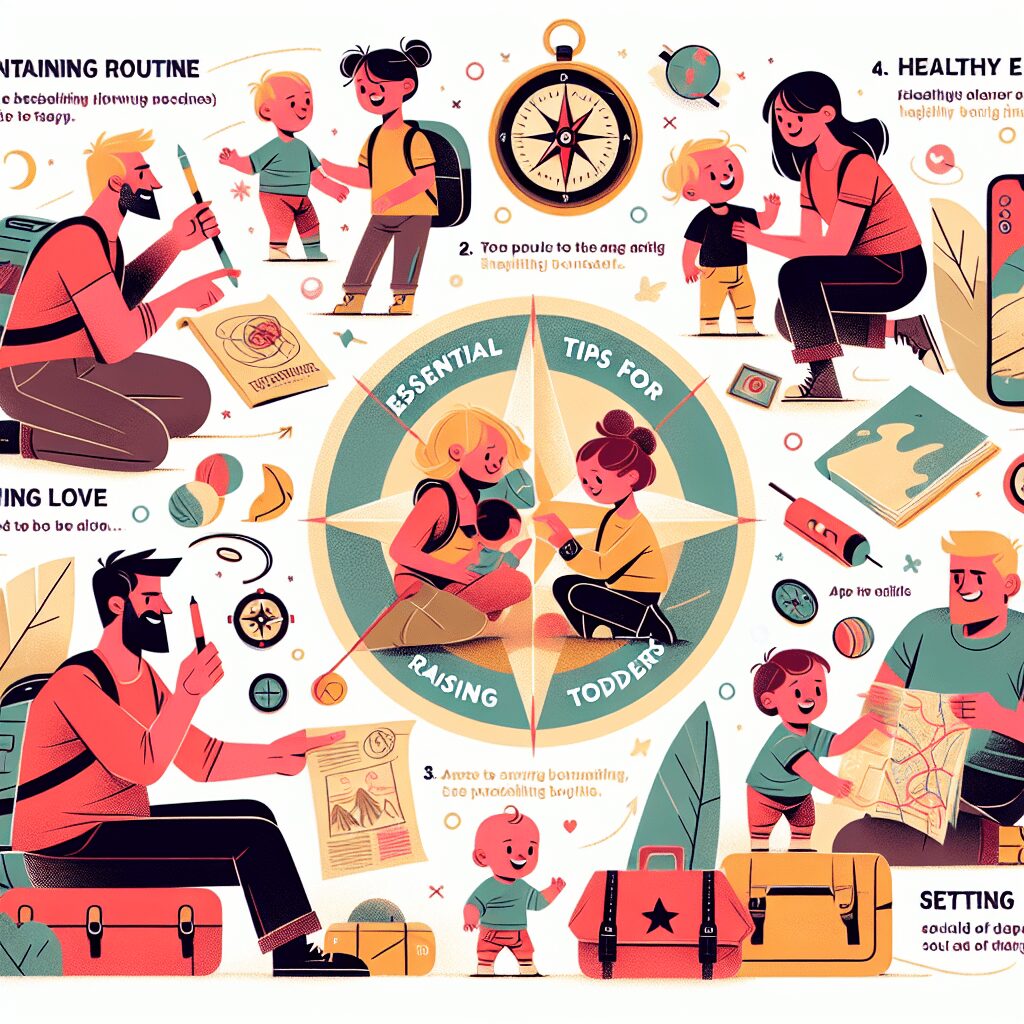10 Essential Parenting Hacks for Surviving the Toddler Years
Parenting can often feel like navigating a ship in a stormy sea, especially when we’re dealing with the turbulent waters of toddlerhood. Those little nuggets of joy can be equal parts energizing and exhausting. In this blog post, we will dive deep into the 10 essential parenting hacks that will help you not just survive but thrive during these chaotic yet precious years. Whether you’re a first-time parent or seasoned veteran, these tips aim to give you peace of mind, foster joy, and create meaningful moments with your little ones. Let’s embark on this journey together.
Chapter 1: Embracing the Power of Routine
Routine provides structure and predictability that toddlers crave. It allows them to feel secure while giving the parent reassurance during those rollercoaster moments of emotional meltdowns. One of the first hacks is to establish a consistent daily routine.
-
Set Regular Wake-Up and Bed Times: Consistency helps toddlers understand what to expect. Establish a wake-up time that allows enough time for breakfast and getting ready for the day.
-
Meal and Snack Times: Designate times for meals and snacks. Incorporating a ‘snack attack’ time can also help manage those moments when they desperately seek something to nibble on.
-
Incorporate Play and Family Time: Try to include time for play and family activities in your routine. This strengthens bonds and creates lasting memories.
Through the power of routine, you will notice fewer tantrums and a more organized household. Your days will flow more seamlessly, and your toddler will flourish with a sense of stability.
Chapter 2: The Art of Redirecting Behavior
Meltdowns and tantrums are natural but can be challenging to navigate. The secret to overcoming these raging storms lies in the art of redirection.
-
Distract and Divert Attention: If you see your toddler getting frustrated or upset, try to redirect their attention to a different toy, activity, or even move to another room.
-
Use Humor and Play: Laughing at the moment or turning it into a game can help diffuse a situation incredibly fast. Toddlers are naturally drawn to fun.
-
Acknowledge Feelings: Help toddlers name their feelings: “I see that you’re upset. Let’s take some deep breaths together.” Acknowledging their emotions can diffuse tension.
By mastering redirection techniques, you’ll gain a superpower in managing chaos and navigating challenging emotions.
Chapter 3: Choose Your Battles Wisely
As parents to a spirited toddler, it’s inevitable to face resistance. Yet here’s the hack: not every battle needs to be fought. Choose your battles wisely.
-
Identify Core Values: Know what’s absolutely essential for your family and their growth. Is it kindness, honesty, or respect? Stick lovingly to those core values when deciding what to enforce.
-
Embrace “Yes”: Instead of saying “no” to everything, find ways to say “yes” to small requests. “Can I wear my superhero cape to dinner?” Sure! It encourages independence while providing joy.
-
Keep Perspective: Remember that toddlerhood is just a phase. What feels critical today may be a delightful memory tomorrow. Focus on developing an overall positive relationship instead of sweating the small stuff.
This hack is akin to a mantra—granting you peace amidst the storm, which is invaluable in maintaining a harmonious household.
Chapter 4: Create Engagement Through Hands-On Learning
Toddlers are naturally curious and eager to explore the world. Use this to your advantage with hands-on engagement.
-
Incorporate Learning into Play: Simple activities like sorting colors, counting objects, or exploring nature provide learning opportunities disguised as fun.
-
Get Creative Together: Encourage creativity through arts and crafts, baking, or small DIY projects. This not only fosters learning but strengthens your bond.
-
Use Everyday Experiences: Grocery shopping can transform into a mini-lesson on colors, shapes, and money using the items you pick together.
By embedding learning within daily engagements, you nurture your toddler’s curiosity and create a joyful learning environment.
Chapter 5: Be the Calm in the Storm
Your toddlers are mirror reflections of your behavior. If you’re calm, they’re more likely to mirror that feeling. This leads us to a crucial hack—maintaining your calm during crises.
-
Practice Deep Breathing: In frustrating moments, take a deep breath before reacting. Model calm reactions so your toddler learns through your example.
-
Mindfulness Moments: Introduce simple mindfulness techniques to help quiet their minds. Visualize a calm beach while counting to ten together.
-
Establish a Calm Corner: Create a designated space where you and your child can go when emotions run high. Fill it with calming objects—like soft pillows, soothing toys, or books.
By being a beacon of calmness, you cultivate an atmosphere conducive to emotional regulation, making parenting easier for both you and your child.
Chapter 6: Harness the Power of Playtime
Play is not just a way to pass the time; it’s essential for toddler development. Understanding this can make your life easier.
-
Plan Playdates: Arrange playdates with other children. It’s not only great for socialization, but your child will come home happy and exhausted, allowing you some downtime.
-
Older Siblings as Allies: Engage older siblings to play with younger ones. Not only does this provide interaction, but it can foster a sense of responsibility and bonding.
-
Outdoor Adventures: Nature is a playground. Explore parks, nature trails, or even your backyard. Outdoor play fosters physical development and provides unique learning opportunities.
By prioritizing playtime, you ensure that your toddlers develop crucial social skills, emotional regulation, and, most importantly, cherished family moments.
Chapter 7: Meal Prep Magic
Toddlers can be notoriously picky eaters. Navigating mealtime can be akin to walking a tightrope, but with meal prep magic, it doesn’t have to be.
-
Involve Your Toddlers: Get your child involved in meal prep. Let them pick fruits or veggies at the store or help with simple tasks in the kitchen. It can turn picky eaters into excited tasters.
-
Create a Weekly Menu: Plan meals for the week ahead. Get your toddler to help choose dishes, providing them a sense of control while ensuring nutrition.
-
Make Healthy Fun: Create colorful plates and try engaging shapes. Use cookie cutters to make sandwiches and visualize ‘healthy monster’ fruits.
With these meal prep hacks, you not only save precious time but also can make mealtime an adventure rather than a battle.
Chapter 8: The Power of Transition
Toddlers can struggle with transitions, whether switching from playtime to bath time or leaving the park. Teaching them to manage transitions empowers them with flexibility and resilience.
-
Visual Timers: Use an hourglass or a timer for transition times to help your toddler see how long they have left to play. They can watch sand fall, indicating time passing.
-
Warning Before Changes: Use countdowns before transitioning activities—“In five minutes, we’re going to clean up!” This helps prepare them mentally for what comes next.
-
Make Transitions Fun: Turn transitioning into a game. Sing a silly song while cleaning up or make bath time a splash party with toys.
By enhancing your child’s understanding of transitions, you reduce meltdowns and build their emotional resilience over time.
Conclusion
The toddler years can indeed be challenging, but with these essential parenting hacks, you’re well-equipped to navigate this beautiful chaos. Establishing routines, employing redirection techniques, choosing your battles wisely, and engaging in hands-on learning are just some of the strategies that create a positive environment. Remember to breathe, stay calm, and cherish these fleeting moments of childhood. Embrace the journey, and know you’re not alone. Your experience, emotions, and small victories matter, and they all contribute to the incredible tapestry of parenthood. Here’s to growing together with your little ones—happy parenting!
FAQs
Q1: What do I do if my toddler refuses to follow the routine?
A1: If your toddler resists a routine, try to involve them in establishing it. Let them feel a sense of ownership over their day, and gradually reinforce the benefits of the routine.
Q2: How can I handle tantrums effectively?
A2: Acknowledge their emotions, stay calm, and redirect their attention. Sometimes, a distraction can be the best immediate response to a meltdown.
Q3: Are there specific toys that can aid in learning during these years?
A3: Yes! Look for toys that promote creativity, such as building blocks, art supplies, or interactive books that encourage engagement and learning.
Q4: Is it normal for toddlers to be overly clingy?
A4: Yes, this can be a phase. Providing reassurance while also encouraging independent play helps them build confidence over time.
Q5: How can I make mealtimes less stressful?
A5: Involve your child in the meals, maintain a relaxed atmosphere, and keep the experience fun. Having humor during mealtimes lightens any pressure.
Q6: What can I do to minimize my stress during these years?
A6: Establish a support network with friends and family. Self-care is essential; find time for your interests, and prioritize relaxation whenever possible.
Q7: How can I implement playdates safely?
A7: Ensure safe environments, supervise interactions, and clearly communicate with other parents about any guidelines or restrictions regarding health and safety.
Q8: When should I be concerned about my toddler’s behavior?
A8: It’s normal for toddlers to exhibit challenging behaviors. However, if you notice significant changes or persistent patterns of frustration, seeking advice from a pediatrician or child psychologist may help.
Instantly Access Your Free Children’s Books Here! (https://payhip.com/BlueCherryStore)
- Disclaimer: As an Amazon Associate, I earn from qualifying purchases; I may earn a commission from qualifying purchases as an affiliate. Please note that I only recommend products I believe will provide value to my readers. (M)









